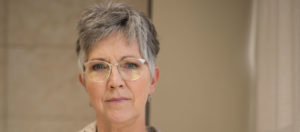Executive of Western New York BloodCare talks about blood disorders and how her organization is helping patients
By Michael J. Billoni

Laurie Reger, executive director of Western New York BloodCare, and who has been with the organization for seven years, is a Daemen College graduate and has practiced as a New York state licensed physical therapist for 25 years. She received her Master of Science degree in health services administration from D’Youville College and has worked many years managing outpatient services for Wyoming County. She is a 2016 Fellow from Cohort V through the Health Foundation of Central and Western New York.
What is the WNY BloodCare mission? Formerly the Hemophilia Center of WNY, we are a nonprofit New York state licensed diagnostic and treatment center offering a variety of specialized diagnostic, health maintenance, lab and pharmacy services for people with blood disorders. This comprehensive treatment center strives to improve the quality of life for people affected by these conditions. Our comprehensive clinics provide evaluations by a team of experts including hematologists, nurses, a physical therapist, dentist, social worker, genetic counselor and nutritionist. Our specialty hemostasis thrombosis lab offers physicians, hospitals and patients state-of-the-art local lab services with up to a two-hour turnaround on special coagulation testing. The 340B Pharmacy provides patients the option to obtain their clotting factor and support the comprehensive care provided through the Hemophilia Treatment Center.
Why did you re-brand the organization? WNY BloodCare was rebranded in 2018 to more accurately reflect the bleeding and clotting populations we support. Not everyone one we serve has hemophilia. There are other bleeding and clotting disorders we serve at the center. Formerly the Hemophilia Center of WNY, we turned 50 years old this year and also moved into our new location adjacent to the Buffalo Niagara Medical Campus and across Main Street from the Conventus Office Building and the University at Buffalo’s Jacobs School of Medicine & Biomedical Sciences.
What is the S.H.E. Clinic? This monthly clinic, hosted by our specialized hematology experts [S.H.E.], includes a gynecologist who provides evaluation and comprehensive treatment plans to support young girls and women suffering from heavy menstrual bleeding. It has been found that of the girls and women with heavy bleeding, as many as 30 percent could have a bleeding disorder that can be treated, which drastically improves their quality of life.
What is your relationship with the University at Buffalo School’s Jacobs School of Medicine and Biomedical Sciences? WNY BloodCare and the Hemophilia Foundation of WNY have donated $1.5 million to the school to fund research into non-malignant hematology, the study of non-cancerous blood related conditions, and support a fellowship to provide a fourth year of training for physicians, growing interest and encouraging doctors specializing in hematology to stay in the region.
How prevalent are blood disorders in WNY and how do people with bleeding and clotting disorders treat their condition? Most blood disorders are hereditary. Prevalence for hemophilia is small. There are an estimated 20,000 affected with hemophilia in the country. However, due to the hereditary nature of this condition, it is very important to get genetic testing for family members. In the past, hemophilia was treated after the individuals had a bleed. Now they are treated preventively with medications that improve the quality their lives and allow them to experience its fullest. Additionally, other bleeding disorders such as von Willebrand disease is more common and affects males and females. Treatments to help manage their conditions are accessible and fairly easy to manage.
Is there anything the public can do to support you? The public can help through spreading awareness and referring people who have symptoms of easy bruising, heavy menstrual bleeding, excessive bleeding after dental procedures.

